Gouging out eyes, cutting off members, poisoning, assassinations, assassinations - in the history of the first ruling dynasty in Poland there are many varieties of cruelty. The Piast rulers pursued their political goals in such ways ... However, what happened to Henry the Fat is beyond human comprehension.
Exceptional atrocities were also committed by the greatest, such as Bolesław the Brave, who invited the Czech prince Bolesław III the Red to Krakow, then captured him and blinded him. Then he himself took power in Prague. However, in the infamous ranking of the most clever ways of inflicting pain, another crime is undoubtedly leading - the torture carried out nearly 300 years later on the Prince of Legnica and Wrocław, Henry V the Fat.
He met an extremely terrifying fate ...
The thing happens during the district breakdown, in the 13th century in Silesia - fragmented into many tiny books, in which, however, there were also fierce and ambitious rulers, ready to fight at all costs with brothers and cousins . Henryk Gruby (Brzuchaty, Tłusty) was the prince of Legnica, the son of the gloomy Bolesław II Hornet. Supposedly, Duchess Jadwiga, a later saint, had once addressed the young Horned woman with the words: "woe, woe to you, Bolesław, how great misfortune you will bring to your land ...".
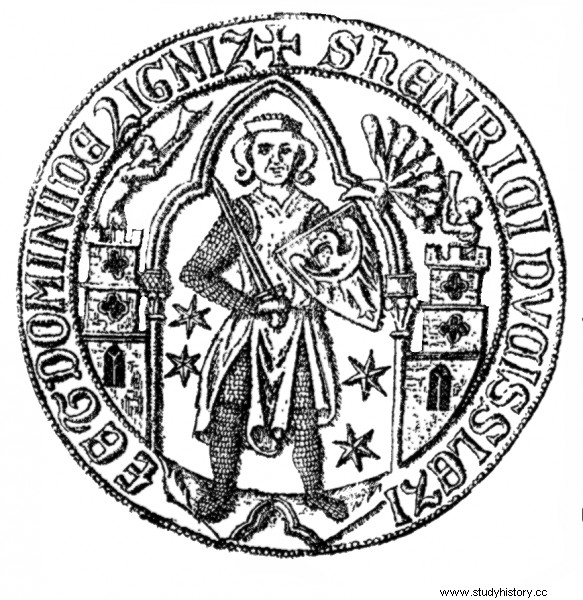
Henry V
Rogatka was famous for his love of warriors and knightly tournaments, which attracted daredevils from all over Europe (he was the organizer of the first knightly tournament in Poland - in Lwówek in 1243). Unfortunately, he was also known for his exceptional cruelty, kidnapping of political rivals, rash decisions, excessive surrounding with Germany , the loss of the land of Lubuskie, which is extremely important for the state, which he sold to the Archbishop of Magdeburg in order to have money to fight with his brother. According to the chronicler, during the expedition against brother Henryk III the White, Rogatka, using German mercenaries, burned five hundred townspeople in the church in Środa Śląska ...
Probus legacy
After such a father, Brzuchaty took over the power. Initially, he ruled in Legnica, but fate gave him a chance to reach for the Duchy of Wrocław.
The opportunity arose after the death of Prince Henry IV Probus, considered one of the most talented of the Silesian Piasts, who several dozen years before Łokietek was close to the unification of the whole country (in 1289 he conquered Krakow, from where he chased Łokietek away).
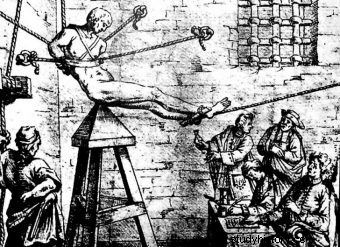
The catalog of medieval torture was very rich. However, what happened to Henry V really leaves his contemporaries in a daze
Henry also went down in history as a well-educated ruler. He learned from the Archbishop of Salzburg - Władysław and from the Czech court. The young man had artistic aspirations. Apparently in his youth he was so-called a minnesinger, and therefore a poet, a musician entertaining at ladies' courts. In medieval chronicles two of his songs and an annotation about the victory in a knightly tournament have been preserved.
So Probus was a representative of the then enlightened elite, a full-mouthed European - as we would say today, which, however, did not prevent him from using as ruthless methods of political struggle as his competitors. Nine years before his death, he invited several local princes for talks, including Henryk Brzuchaty and his later tormentor Henryk Głogowski. After the invitation, when the guests arrived, he captured them in the church and imprisoned them by forcing consent to submit to his will.
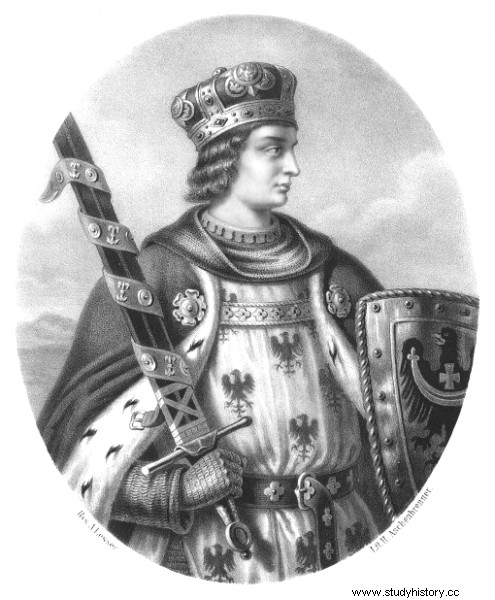
Henry IV Probus
Let us note that Probus himself fell victim to a dirty game. He was probably poisoned. In 1290, he fell ill with an undefined disease, thinned and weakened day by day. Eventually he died. Medieval historians had no doubts that poison was behind his death. A sensational report on this topic is provided by the so-called the chronicle of Ottokar. Well, Probus was to be murdered by his courtiers, and the motive was to be money that the ruler wanted to pay the Pope's consent to his coronation. According to the chronicler's account, part of the money was stolen by a courtier sent by Probus to Rome. And it was he who - with the help of his brother - a medic who worked at the ducal court, was to plot the plot consisting in the gradual poisoning of the prince.
Today, this version of events sounds like a Hollywood movie, but historians generally agree that someone helped Probus leave this world. The poisoner could act at the request of one of the princes who were ready to take over the inheritance of Henryk - for example, the Belly-like ...
Anyway - the dying Probus handed over Wrocław to his supporter Henryk III of Głogów on his deathbed. The court and the mighty of Wrocław, after the duke's departure to the other world, had different plans for succession. As a result of intrigues, Głogowski ruled in Wrocław for only a month. A rebellion broke out in the city, the prince had to flee, and the mighty handed over power to Henry the Fat.
Thus, another armed conflict broke out in the Silesian district. Both sides looked for helpers abroad. Głogowczyk tied up with the Germans, Brzuchaty with the Czechs.
Traitor left
As reported by the Chronicle of Polish princes , Henryk Głogowski also played a dirty game in order to win over his competitor. The chronicler reports that he "often ambushed him".
These did not work for a long time, and finally Głogowczyk found a man who, properly motivated, was ready to capture the prince and kidnap him. This man was a certain Lewko - a knight of Henry Brzuchaty, one of his best armed men, in whom the prince had full confidence.
Henryk Głogowski's envoys knew how to approach Lewka. Here is Henryk Brzuchaty once condemned to death the knight's father - Pakosław. He handed down the sentence after Pakosław - belonging to the Wrocław elite - killed a man. The mighty people of Wrocław perceived the verdict negatively. It turned out that, against their expectations, Stomach did not intend to be a painted ruler, but wanted to rule realistically. Moreover:he did not trust the former aristocracy of Probus and slowly removed them from influencing the course of affairs.
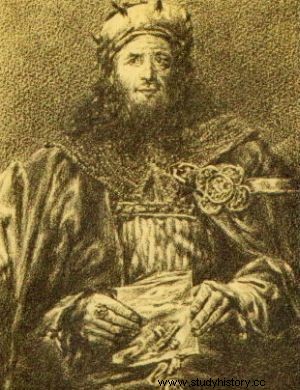
Henry V has undergone unimaginable torture
Henryk Głogowski's envoys reached Lewek and reminded him of the sentence made on his father. They certainly motivated him with more than that. The chronicle also mentions the "gifts" received by the knight. The traitor made a deal. He prepared himself well for the task. He appointed a group of assassins who were probably well paid by Głogowski. Because he knew the prince's way of life and schedule, he knew when to strike to make the ruler vulnerable.
His people got to the prince's seat while the belly was in the bathhouse. The servants still managed to inform him that an armed detachment was approaching, but the latter underestimated the threat, declaring his trust in his knight. Let us give the floor to the chronicler:
And when (Lewek) the ducal servants saw him that he was approaching with an armed army, they reported it to Prince Henry, who replied that he was not afraid of Lewek's ambushes, because he was his friend and best adviser. But the cursed traitor, attacking the prince near the Wrocław castle, captured him in the bathhouse, along with his comrades who pulled him out of the bathhouse; there was no defense because all the prince's friends were naked; one of them fell on the prince, wanting to protect him, but because he was disturbing, he was killed. Having captured the aforementioned prince, they quickly put him on a horse and, throwing a poor coat over him that day and at night, took him to the town of Sandwel, to hand him over to prince Henryk (Głogów).
The cage
What happened next fully deserves a place in the scripts of the most terrifying horror films. It can be said that in this case, life has surpassed fiction. It is not known what Głogowczyk was guided by:did he hate his opponent so much, did he take pleasure in inflicting suffering, or finally chose such cruel torture, appreciating the strength of his opponent's character? We will never know the answer to this question, at least shortly after the delivery of the Fat to Henryk Głogowski's court, his captor gave the order to prepare a special cage for his prisoner ...
Let the chronicler speak again:
He ordered a chest to be made, with an iron grate through which he could breathe and receive food, and left another, similarly well-protected opening for him to defecate through it, and kept him in prison in the most horrible way for almost six months, that a mass of bugs crawled out of his thighs and back, especially since he could neither stand nor sit nor even lie down, so cramped . And for this he was tormented by these sufferings, to force him to force cities and their surroundings, that is:Namysłów, Bierutów, Oleśnica, Kluczbork, Byczyna, Wołczyn, Olesno, Chojnów and Bolesławiec.
After six months, when the Heavy's body began to stink terribly, rot from bedsores, ulcers, infections and dirt, his tormentor finally broke off his horrific torture . The battered man agreed to everything. He gave Głogowski not only the disputed cities, he also agreed to pay a tribute of 30,000 fines. He also made a commitment not to seek revenge.
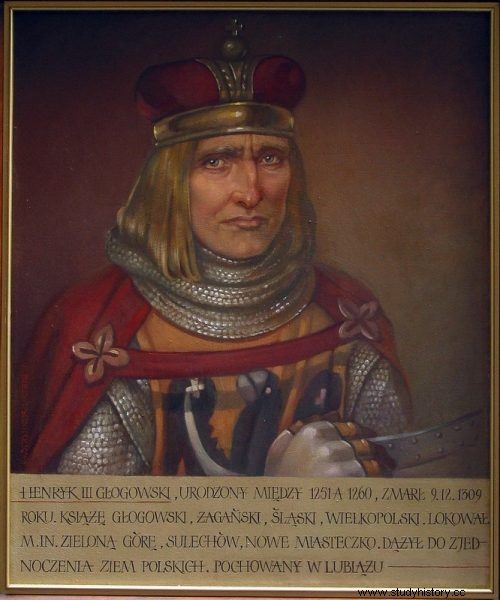
Henryk III Głogowski
This last point was, in fact, utter fiction. Because of his release from captivity, Stomach was a wreck of a man, unable to act - mentally and physically broken. The torment took a heavy toll on him. He never recovered and left his principality under the protection of the Holy See. He died just two years later.
And his torturer? This story shows that, contrary to naive beliefs, fate is not always fair and does not reward the beautiful for what it is. Crime is not always punishable, the so-called Karma doesn't always come back. After tormenting the Fat, Henryk Głogowski ruled for another 13 years. He effectively implemented his policy, enlarged and strengthened the principality. He even used the title "Heir of the Kingdom of Poland". He died a natural death in 1309. He was buried in the Cistercian Abbey in Lubiąż.
